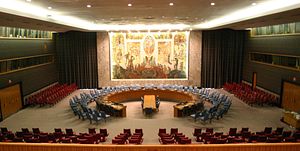At a dramatic meeting of the United Nations Security Council on October 24, the anniversary of the founding of the UN in 1945, the chair of a special independent investigative commission on Myanmar starkly outlined a campaign of atrocities by the government’s security forces against the country’s Rohingya Muslims.
Marzuki Darusman, the chairperson of the Independent International Fact-Finding Mission on Myanmar (FFM) that the UN Human Rights Council in Geneva set up last year, briefed council members on the “human rights catastrophe” faced by the Rohingya from military “clearance operations” in northern Rakhine State beginning in August 2017. He detailed his mission’s comprehensive documentation of murder, mass rape, enforced disappearance, arson, looting, torture, and “large-scale massacres including of women, children, and elderly,” among other brutalities. The mass abuses have forced over 700,000 Rohingya to flee to Bangladesh over the past year.
Darusman told the Security Council that many of the military’s atrocities amounted to “genocidal acts” and that “genocidal intent can be reasonably inferred” from senior military leaders’ statements and from the details and context of the campaign. After the clearance operations, the Fact-Finding Mission noted, the government consummated the “ethnic cleansing” by completely destroying Rohingya villages and building new structures for non-Rohingya populations. The mission separately found that abuses were part of “a systematic attack on a civilian population” amounting to crimes against humanity, and that some of the abuses amounted to acts of “extermination.”
Darusman separately outlined how Rohingya remaining in Rakhine State live in almost complete segregation and ghettoization, with minimal access to basic government services and facing near-total deprivation of basic rights, including the right to citizenship. “This systematic oppression and discrimination” in Rakhine, the mission found, “not only supports a finding of persecution but may also amount to the crime of apartheid.”
Many of the mission’s factual findings corroborate earlier research and findings by Human Rights Watch and other groups, documenting the military’s use of mortars, heavy and light weapons, fire-bombing and arson, and close-range shootings, knife and bayonet attacks, summary executions, and widespread rape. The mission’s report also outlined grave abuses by the military in Kachin and Shan States, as well as sexual slavery, enslavement, and forced labor. He also noted earlier abuses against Rohingya, in 2012 and 2016.
When they invited Darusman to share his report at a formal meeting, a majority of Security Council members actively affirmed that they considered the crimes and human rights violations documented by his team to constitute “an ongoing threat to international peace and security.” The council also set an important precedent by bridging its work with efforts of other UN human rights bodies. For the first time in the Security Council’s history, a body set up by the Human Rights Council provided a direct briefing to the Security Council.
The same day of the briefing, Darusman joined Yanghee Lee, the UN special rapporteur on the situation of human rights in Myanmar, for a news conference in which Lee echoed many of the mission’s concerns. Lee also highlighted the Myanmar government’s continuing denial and obstruction of international efforts to address the Rohingya crisis, describing “a government that is increasingly demonstrating that it has no real interest and capacity in establishing a fully functioning democracy,” or holding anyone accountable for abuses the UN has documented.
Both Darusman and Lee made a point of noting that the government’s failures and unwillingness to even acknowledge their abusive conduct was what made international attention so important.
It has been well over a year since the UN secretary-general, in a letter sent to the council in September 2017, first brought the need for action on the “catastrophic” Rohingya crisis to the Security Council’s attention. The Security Council urgently needs to consider the mission’s new recommendations, including that the council should refer the situation in Myanmar to the International Criminal Court and impose sanctions and a global arms embargo on the country until it carries out fundamental reforms.
Unfortunately, such Security Council action is in serious doubt. Two of the council’s permanent members, China and Russia, were opposed even to hearing Darusman’s briefing this week and continue to oppose any resolution that would impose such measures. The United Kingdom, which by UN tradition drafts and offers all Myanmar documents in the Security Council, has not advanced any draft resolution to address the Rohingya crisis.
The Security Council members that requested this week’s briefing should, with the support of other UN member countries, work to isolate Chinese and Russian obstructionism until it becomes untenable.
The attacks on the Rohingya should not remain unaddressed by the international community. The United Nations was founded, exactly 73 years ago, in large part to address mass atrocities like those committed against the Rohingya. It would be a stunning failure of the UN mission to give up now.
John Sifton is the Human Rights Watch’s Asia advocacy director.

































